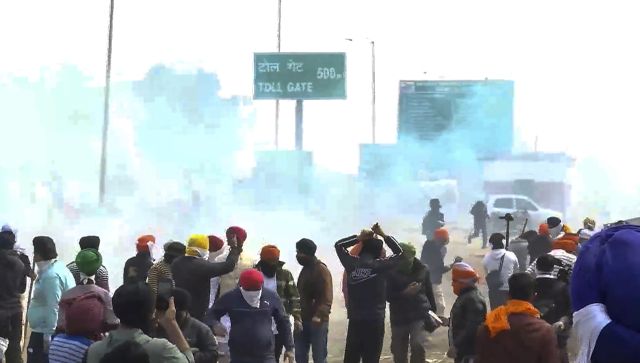The Delhi chalo march by agitating farmers causing chaos at the borders of Uttar Pradesh, Haryana and Punjab.
The march on the National Capital is being carried out by farmers and their supporters to demand a law guaranteeing Minimum Support Price.
More than 200 farm unions are marching to Delhi, according to the Samyukta Kisan Morcha (Non-political) and the Kisan Mazdoor Morcha.
“The government has not been able to make a strong decision on anything … We thought that giving time is not suitable now,” Sarwan Singh Pandher, the general secretary of Punjab Kisan Mazdoor Sangharsh Committee (KMSC), told ANI.
But what’s happening on the borders? How has traffic been impacted?
Let’s take a closer look:
What happened?
On Tuesday, farmers from Punjab and Haryana began making their way towards the National Capital.
The cultivators were on foot as well as loaded with dry rations, water-proof sheets and mattresses in large convoys of tractors-trolleys.
Gurmeet Singh from Masteke village in Punjab’s Ferozepur told Indian Express, “Ferozepur alone had sent over 100 tractor-trolleys. More farmers are coming from across the state to join us.”
At midday, police fired multiple tear gas rounds to disperse the marchers at Shambhu, a border crossing between Punjab and Haryana, around 230 kilometres north of Delhi, where many had joined the march.
As per NDTV, huge plumes of smoke were seen as as the cultivators, their backers and the media scattered to avoid tear gas.
The police fired around two dozen shells despite no immediate signs of provocation and also dropped smoke bombs via drones to disperse the agitators.
Impact Shorts
More ShortsFootage showed protesters trying to break through the barricades by lifting away cement blocks placed there to halt the march, as police used drones to fire tear gas rounds into the crowd.
#WATCH | Protesting farmers forcibly remove the cement barricade with their tractors as they try to cross over the Haryana-Punjab Shambhu border. pic.twitter.com/gIyGNy8wsi
— ANI (@ANI) February 13, 2024
Police also used water cannons, as per ANI.
#WATCH | Police use water cannons to disperse the protesting farmers at the Haryana-Punjab Shambhu border. pic.twitter.com/TbdXCytCMX
— ANI (@ANI) February 13, 2024
Some protesters were also detained.
“The farmers are peaceful (but) tear gas is being used against us through drones. The protest will continue till the government agrees to our demands,” Punjab Kisan Mazdoor Sangharsh Committee general Secretary Sarwan Singh Pandher told NDTV.
As per _Indian Expres_s, three farmers were detained for trying to cross the Ghazipur border.
The men identified themselves as members of the Bhartiya Kisan Union (Mahatma Tikait group)
The outskirts of Delhi were quiet with riot control teams standing guard behind barricades on main roads leading into the National Capital, where police have prohibited large gatherings.
What about Delhi?
Tight security arrangements have made in the backdrop of hundreds marching on the National Capital.
The Delhi Police on Monday had enforced Section 144 of the Code of Criminal Procedure (CrPC) across the entire city.
“We are fully prepared to deal with any kind of law and order situation. Multi-layered arrangements are there to stop farmers from entering Delhi,” a senior police officer said.
According to NDTV, authorities have put concrete blocks and nails on vital roads to stop tractor-trollies from entering Delhi.
Key border crossings have been shut down – thus resulting in gridlock at the Ghazipur and Chilla.
As per News18, 114 companies, including 64 paramilitary forces and 50 from Haryana Police, have been deployed at several areas.
The outlet quoted DCP (traffic) Anil Kumar Yadav as saying vehicles were being searched at both sides of the Noida-Delhi border.
“Proper arrangements for traffic have been done. QRT (quick response teams), marshals have also been deployed. The vehicular movement is being constantly monitored through the Integrated Safety and Traffic Management System (ISTMS). In addition to all this, we are also using drones to keep a watch on traffic movement,” Yadav added.
Advisories have also been issued to flyers at Indira Gandhi International Airport.
“Please be advised that due to the anticipated farmers’ protest at different Delhi borders starting on 13.02.2024, there will be traffic diversions in effect. For commercial vehicles, traffic restrictions and diversions will be implemented starting from 12.02.2024,” the advisory read.
Kind attention to all flyers!#TrafficAdvisory #DelhiAirport https://t.co/0wGK8FWjeO pic.twitter.com/Sy1KE51YE3
— Delhi Airport (@DelhiAirport) February 12, 2024
“To ensure timely arrival, we strongly encourage travelers to utilise the Magenta Line for Terminal 1 (T1) or the airport metro for Terminal 3 (T3) for convenient transportation option,” the advisory added.
The Delhi Police also closed all the entry and exit points of the nearby streets and villages connecting the highway near Tikri Metro Station.
However, the metro services on the green line is still working.
Many are also worried about possible face-off between protesters and police on the heavily barricaded entry roads.
The multi-layer security arrangements to prevent the entry of protesters in Delhi have restricted the movement of locals.
“We have nothing to do with any protest, but to reach home after work we are asked to show our ID cards at more than three different places,” said Raja Ram, who works as a labourer and is a resident of Tikri Kalan.
The Delhi Police has been preparing to stop the farmers from entering the national capital as a meeting between the agitating groups and Union government in Chandigarh yielded no results.
According to officials, more than 5,000 police personnel, including paramilitary forces, have been deployed in border areas — Tikri, Singhu and Ghazipur – to maintain law and order.
“Farmers are coming from Haryana and Punjab and no locals are involved, but due to such protests we face difficulties doing our business as police do not allow us to open our shops,” said Devendra Singh, who runs an eatery near Tikri border Metro station.
People are also facing hardships due to traffic chaos caused by diversions from different routes from Mundka of Delhi towards Haryana.
“There are many schools in villages. Children are facing a lot of difficulty in reaching home. If police have diverted traffic, they must deploy someone to manage it as well,” said Surender Kumar, a resident of Tikri Kalan village.
Traffic crawled at a snail’s pace at many places in the Delhi-National Capital Region on Tuesday as police placed multiple layers of barricades and stopped the movement of vehicles at the Singhu and Tikri borders to thwart the farmers’ march to the city.
Commuters faced a harrowing time on the roads, battling massive traffic snarls with Delhi being put under a heavy security cover with personnel in anti-riot gear deployed strategically and metal and concrete barricades regulating access to several key roads.
There was severe traffic congestion in the Ghazipur border area as well due to heavy security arrangements made by police. Only two vehicles were allowed to pass at a time with barricades being lined up on half of the key stretch connecting Noida and Delhi.
Feeling helpless and desperate at being stuck at the Ghazipur border for hours, Uttarakhand resident Arun Singh said he was on his way to visit his ailing father at the Lok Nayak hospital in Delhi.
“I am travelling from Uttarakhand to meet my 78-year-old father… My family and I have been struck here since 11 am. It is an extremely frustrating situation for us and we feel angry and helpless,” he told PTI.
Agriculture minister says ‘hopeful’
Agriculture Minister Arjun Munda told reporters on Monday after talks with union leaders that some issues had been resolved but more discussions were needed.
“We are hopeful that we will bring solutions,” he said.
Munda on Tuesday said a law guaranteeing Minimum Support Price (MSP) on crops cannot be brought in a hurry without consulting all stakeholders and urged the protesting farmer groups to have a structured discussion with the government on the issue.
In an interview with PTI, Munda also cautioned the protesting farmers to be “aware and alert” about some elements which could defame their protest for political benefits.
Munda is part of the ministerial delegation that held two rounds of discussion with the farmers’ groups, including Samyuka Kisan Morcha (non-political), Kisan Mazdoor Morcha in Chandigarh, to resolve their concerns.
But farmers insist they are in it for the long haul this time.
“From a needle to hammer, we have everything we need, including tools to break stones. We left our village with six months’ ration with us. We have enough diesel, even for our brothers from Haryana,” Harbhajan Singh from Punjab’s Gurdaspur told NDTV.
Singh, who took part in the 2020 protest, added, “We didn’t budge through 13 months last time. We were promised our demands will be met, but the government didn’t keep its promise. This time, we will leave only after all our demands are met.”
Kuldeep Singh of Takhtumajra village in Rajpura told Indian Express, “They themselves are creating a wall with us as if we are terrorists and not even part of this country. So what message are they sending to farmers? As of now, only a few unions are part of this protest, but if the situation worsens, all farmers will join hands like before.” Sardara Singh of Ferozepur district added, “Most of us in the convoy are from border districts Ferozepur, Amritsar, Gurdaspur, Taran Taran; hence, we are used to tough conditions.”
Meanwhile, security has been heightened along Rajasthan’s borders with Haryana and Punjab and mobile internet suspended in three districts in view of the farmers’ ‘Delhi Chalo’ march.
Inspector General of Police, Bikaner Range, Om Prakash visited the Ratanpura border and reviewed the arrangements. He spoke to police personnel and issued necessary instructions.
He said mobile internet has been suspended for the day in Hanumangarh, Sriganganagar and Anupgarh districts and borders have been sealed.
“Security is high at the borders. Ten checkpoints have been set up at the borders in Hanumangarh, Sriganganagar and Anupgarh,” Prakash said.
“There are no farmers in the rest of the area except for Sadhuwali in Sriganganagar. Around 200 farmers are expected to gather at Sadhuwali and additional policemen have been deployed there,” he said.
‘Centre failed farmers’
Meanwhile, the Congress said the government had failed the farmers.
“As a result of inadequate market prices and simultaneous price increase of inputs, farmers are falling deeper into debt,” Congress lawmaker Jairam Ramesh said in a social media post.
VIDEO | Here's what Congress leader Jairam Ramesh (@Jairam_Ramesh) said at a press conference in Ambikapur, Chhattisgarh.
— Press Trust of India (@PTI_News) February 13, 2024
"The (farmers') unions are demanding the fulfilment of the promises made to them (by the central government). Rahul Gandhi met with farmers' unions and… pic.twitter.com/TnPLy2mATa
The Congress on Tuesday condemned the BJP governments at the Centre and in states for stopping protesting farmers from marching to Delhi and promised to fulfil their key demand of a law guaranteeing MSP for various crops once the INDIA bloc comes to power.
Supporting the farmers’ agitation, the opposition party asked Prime Minister Narendra Modi to directly talk to them and provide justice.
“Farmer brothers, today is a historic day! Congress has decided to give a legal guarantee of MSP to every farmer on crops as per the Swaminathan Commission.
“This step will change the lives of 15 crore farmer families by ensuring their prosperity. This is the first guarantee of Congress on the path of justice. #KisaanNYAYGuarantee,” Rahul Gandhi said in a post in Hindi.
Congress president Mallikarjun Kharge accused the Modi government of crushing the voice of farmers after “failing” to fulfil the promises made to them over 10 years.
“If Congress comes to power at the Centre (after the Lok Sabha polls), it will ensure legal guarantee to MSP in the interest of farmers. It is our first guara-ntee,” Kharge said during Gandhi’s `Bharat Jodo Nyay Yatra’ in Ambikapur district of Chhattisgarh.
The government announces minimum prices for more than 20 crops each year, but state agencies buy only rice and wheat at these prices, which benefits only about six per cent of farmers.
In 2021, when the year-long protest by farmers pushed Modi’s administration to repeal some farm laws, designed to deregulate vast agricultural markets, the government said it would set up a panel to find ways to ensure support prices for all farm produce.
Farmers accuse the government of going slow on that promise.
With inputs from agencies


)

)
)
)
)
)
)
)
)



